
Secret of Mana, originally released in Japan as Seiken Densetsu 2, is a 1993 action role-playing game developed and published by Square for the Super Nintendo Entertainment System. It is the sequel to the 1991 game Seiken Densetsu, released in North America as Final Fantasy Adventure and in Europe as Mystic Quest, and it was the first Seiken Densetsu title to be marketed as part of the Mana series rather than the Final Fantasy series. Set in a high fantasy universe, the game follows three heroes as they attempt to prevent an empire from conquering the world with the power of an ancient flying fortress.

Koei Co., Ltd. was a Japanese video game publisher, developer, and distributor founded in 1978. The company is known for its historical simulation games based on the novel Romance of the Three Kingdoms, as well as simulation games based on pseudo-historical events.
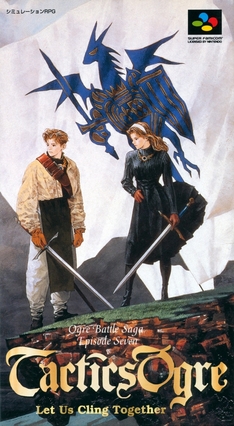
Tactics Ogre: Let Us Cling Together is a 1995 tactical role-playing game developed and published by Quest Corporation for the Super Famicom. It was later ported to the Sega Saturn (1996) and the PlayStation (1997), the latter released in North America in 1998 by Atlus USA. The second entry in the Ogre Battle series, the story takes place in the war-torn kingdom of Valeria, where protagonist Denim Powell works in a local resistance force against occupying powers, ending up caught in the ethnic conflicts driving the war. Battles are turn-based, taking place on grid-based maps from an overhead perspective with a focus on positioning and using character class abilities.
Tactical role-playing games, also known as strategy role-playing games and in Japan as simulation RPGs, are a video game genre that combines core elements of role-playing video games with those of tactical strategy video games. The formats of tactical RPGs are much like traditional tabletop role-playing games and strategy games in appearance, pacing, and rule structure. Likewise, early tabletop role-playing games are descended from skirmish wargames such as Chainmail, which were primarily concerned with combat.

Live A Live is a 1994 role-playing video game developed and published by Square for the Super Famicom. A remake was published by Square Enix in Japan and Nintendo worldwide, releasing first for Nintendo Switch in 2022, and the following year for PlayStation 4, PlayStation 5, and Windows. The game follows seven distinct scenarios scattered across different time periods, with two more unlockable scenarios linking the narratives together through the recurring antagonist Odio. Gameplay is split between exploration with story-specific twists, and turn-based combat played out on a grid.

Unlimited Saga is a 2002 role-playing video game developed and published by Square for the PlayStation 2 as the ninth game in the SaGa series. It was released in 2002 in Japan and 2003 in North America and Europe; its European version was published by Atari Europe. The story follows seven characters as they explore mysteries connected to the Seven Wonders, artifacts left by an ancient civilization said to be capable of triggering a golden age. Battles carry over the skill-based levelling systems and nonlinear structure of earlier SaGa titles, with an exploration structure similar to a board game.

Breath of Fire III is a role-playing video game developed and published by Capcom originally for the PlayStation console as part of the Breath of Fire series. Initially released in Japan on September 11, 1997, the game was later released in North America and Europe in 1998. It is the first game in the franchise to feature three-dimensional graphics and voice acting. The title was developed by director Makoto Ikehara and features a unique jazz-inspired soundtrack by company composers Yoshino Aoki and Akari Kaida. On August 25, 2005, the game was ported and released for the PlayStation Portable handheld system in Japan, and was also released in Europe on February 3, 2006.
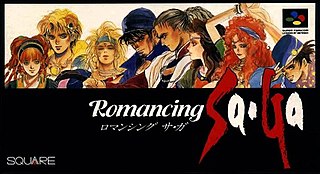
Romancing SaGa is a 1992 role-playing video game developed and published by Square for the Super Famicom. It is the fourth entry in the SaGa series. It was subsequently released for the WonderSwan Color in 2001 and mobile phones in 2009. A remake for the PlayStation 2, subtitled Minstrel Song in Japan, was released in both Japan and North America in 2005 by Square Enix. A remaster of Minstrel Song was released worldwide in 2022 for Android, iOS, Nintendo Switch, PlayStation 4, PlayStation 5 and Windows.
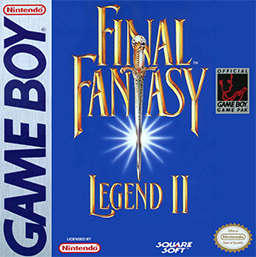
Final Fantasy Legend II, known in Japan as SaGa 2: Hihou Densetsu, is a role-playing video game developed and published by Square for the Game Boy. The second entry in the SaGa series, it was released in 1990 in Japan, and in 1991 in North America. A later edition was released in North America in 1998 through Sunsoft. A remake for the Nintendo DS was released in 2009 by Square Enix, remaining exclusive to Japan. The Game Boy version was later ported to the Nintendo Switch and released worldwide by Square Enix in 2020, with later ports to Android, iOS and Microsoft Windows in 2021.

Final Fantasy Legend III, known in Japan as SaGa 3: Jikuu no Hasha, is a role-playing video game developed and published by Square for the Game Boy. The third entry in the SaGa series, it was released in Japan in 1991 and in North America in 1993. A later edition released in North America in 1998 through Sunsoft. A remake for the Nintendo DS was released in 2011 by Square Enix, remaining exclusive to Japan. The Game Boy version was later ported to the Nintendo Switch and released worldwide by Square Enix in 2020, with later ports to Android, iOS and Microsoft Windows in 2021.
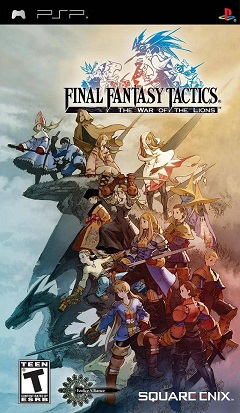
Final Fantasy Tactics: The War of the Lions is a tactical role-playing game developed and published by Square Enix for the PlayStation Portable (PSP). The game is an updated version of Final Fantasy Tactics made for the PlayStation, which was released in 1997.
The 1990s was the third decade in the industry's history. It was a decade of marked innovation in video gaming. It was a decade of transition from sprite-based graphics to full-fledged 3D graphics and it gave rise to several genres of video games including, but not limited to, the first-person shooter, real-time strategy, survival horror, and MMO. Arcade games, although still relatively popular in the early 1990s, began to decline as home consoles became more common. The fourth and fifth generation of video game consoles went on sale, including the Super Nintendo, Sega Saturn, PlayStation, Nintendo 64, and Game Boy Color. Notable games released in the 1990s included Sonic the Hedgehog, Doom, Wolfenstein 3D, Quake, Duke Nukem 3D, GoldenEye 007, Unreal Tournament, Half-Life, Grand Theft Auto, Super Mario 64, Pokémon Red and Blue, Daytona USA, Ridge Racer, Gran Turismo, Castlevania: Symphony of the Night, Super Metroid, The Legend of Zelda: Ocarina of Time, Metal Gear Solid, Virtua Fighter, Final Fantasy VII, Sega Rally Championship, Nights into Dreams, Panzer Dragoon, Gunstar Heroes, Battletoads, Micro Machines, Donkey Kong Country, Wipeout, Lemmings, Banjo-Kazooie, PaRappa the Rapper, Tony Hawk's Pro Skater, Soulcalibur, and Dance Dance Revolution.

Trinity: Souls of Zill O'll, known in Japan as Trinity: Zill O'll Zero, is an action role-playing video game developed by Omega Force, a part of the Zill O'll series, which had previously appeared on PlayStation, PlayStation 2 and PlayStation Portable. The game is a prequel, taking place five years before the events in Zill O'll.
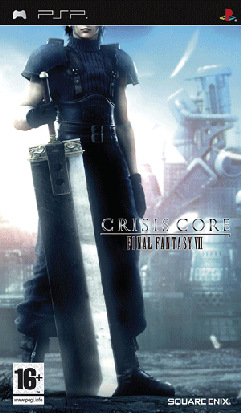
Crisis Core: Final Fantasy VII is an action role-playing game developed and published by Square Enix for the PlayStation Portable. First released in 2007, the game is a prequel to the 1997 video game Final Fantasy VII and is a part of the metaseries Compilation of Final Fantasy VII, which includes other products related to the original game.
While the early history and distinctive traits of role-playing video games (RPGs) in East Asia have come from Japan, many video games have also arisen in China, developed in South Korea, and Taiwan.

Tactics Ogre: Let Us Cling Together is a 2010 tactical role-playing game developed and published by Japanese company Square Enix. It is a remake of the 1995 Super Famicom title of the same name, second entry in the Ogre Battle series. The remake retains the same strategy RPG gameplay of the original, focusing on turn-based tactical battles and the use of character classes. The game incorporates additional features such as equipment crafting and the ability to revisit branch points in the game's narrative, in addition to multiplayer functionality. The storyline, following the actions of rebel fighter Denam Pavel during a civil war within the kingdom of Valeria, was also expanded with new scenes and characters.

Final Fantasy is a fantasy role-playing video game developed and published by Square in 1987. It is the first game in Square's Final Fantasy series, created by Hironobu Sakaguchi. Originally released for the NES, Final Fantasy was remade for several video game consoles and is frequently packaged with Final Fantasy II in video game collections. The first Final Fantasy story follows four youths called the Warriors of Light, who each carry one of their world's four elemental crystals which have been darkened by the four Elemental Fiends. Together, they quest to defeat these evil forces, restore light to the crystals, and save their world.

Atelier Marie: The Alchemist of Salburg is a 1997 role-playing video game developed and published by Gust. The first entry in the Atelier series, it originally released for the PlayStation, then received ports and enhanced versions on other platforms. A remake for modern platforms, Atelier Marie Remake, was released worldwide in 2023 by Koei Tecmo. Following the efforts of alchemist-in-training Marie to pass an exam within five years, the gameplay focuses on exploring for materials to create alchemical recipes, and completing story missions and requests within the in-game time limit.

Final Fantasy III is a Nintendo DS role-playing video game and a remake of the 1990 Family Computer game, Final Fantasy III.
















